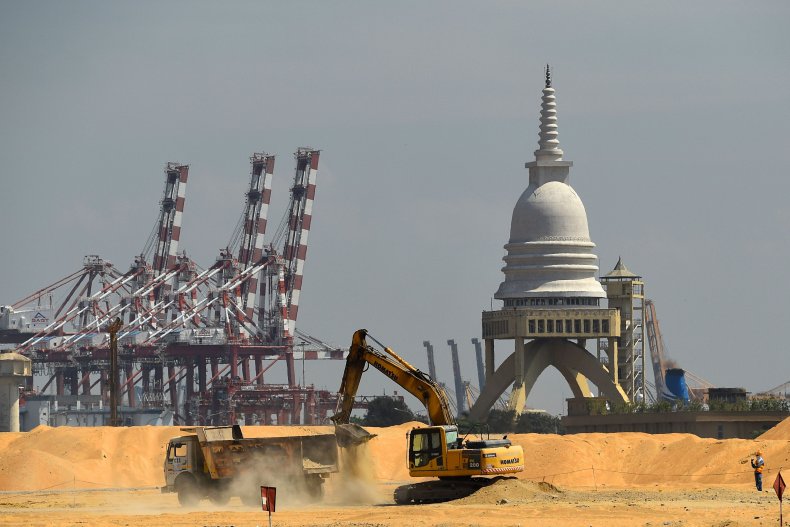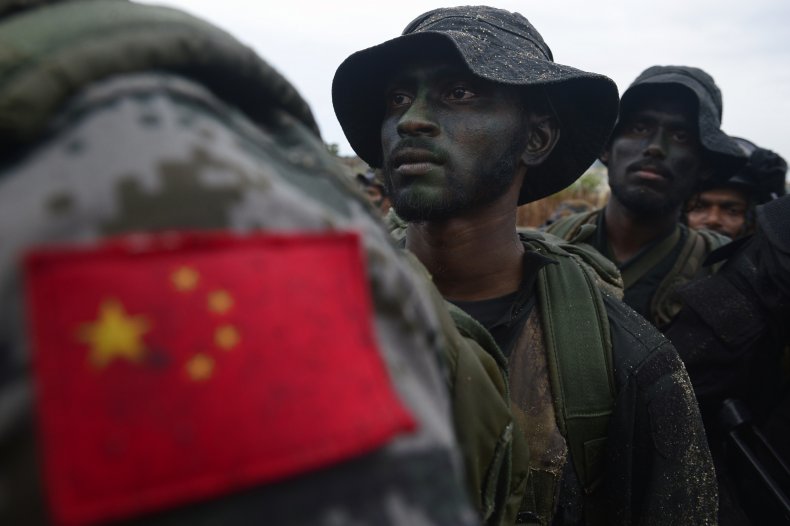ISIS Church Bombs Help China Gain Indian Ocean Ally to America’s Chagrin
Posted on August 22nd, 2020
BY
Outrage following a deadly Islamic State militant group (ISIS) bombing last year helped pave the way for a return to power for Sri Lanka’s influential Rajapaksa brothers, two men who have forged a close relationship with China in spite of the United States’ attempts to contain the People’s Republic in the region.
For a decade, President Mahinda Rajapaksa and Defense Minister Gotabaya Rajapaksa dominated Sri Lankan politics, gaining popularity with a decisive victory over the Tamil Tigers insurgent group. The brothers stepped down after elections in 2015 brought a change in government. But the 2019 Easter Sunday blasts that killed more than 260 rocked the South Asian island nation, which is located off the southern tip of India in the strategically important Indian Ocean.
Outrage over the perceived negligence on the part of the standing government fueled a nationalistic wave that propelled Gotabaya Rajapaksa to a victory in elections last November. He assumed office earlier this month.
Gotabaya Rajapaksa moved quickly to appoint his brother as premier, re-establishing the grip of his family on Sri Lanka. That consolidation of power appears to be leading to an acceleration and expansion of the country’s growing relationship with China, which has poured billions of dollars into infrastructure endeavors, from a performing arts theater to a strategic port in the strategically located island. Sri Lanka is a key part of Beijing’s worldwide Belt and Road Initiative (BRI), one of its “String of Pearls” linking Chinese projects across the Indian Ocean from Asia to Africa.
“We have consistently expressed our concerns about the People’s Republic of China’s (PRC) predatory lending practices in many countries, which threaten to cripple developing nations that are already suffering heavy debt loads and the pandemic’s impact on their economies,” a State Department spokesperson told Newsweek.
“Beijing issues loans through opaque, state-backed arrangements that undercut international standards of transparency and debt sustainability, often to fund projects of questionable economic value built by Chinese firms,” the spokesperson said. “In doing so, the PRC undermines the competitiveness of the local private sector and stifles sustainable development in the places that need it most.”
The spokesperson told Newsweek that the State Department has instead encouraged nations like Sri Lanka “to prioritize an alternative approach – a transparent, private sector-driven investment, grant, and business model – with a proven track record for delivering sustainable growth, reducing poverty, and fostering technological innovation.”

When confronted with criticism of the BRI during his first post-election India trip in February, Mahinda Rajapaksa told the Hindustan Times that Sri Lanka had benefited from the BRI.
“By the way, let me remind you,” Rajapaksa said, “our external debt towards China is only 12 percent of our overall external debt, and we have not defaulted. We used whatever money we took from them to build infrastructure.”
Reached for comment, China’s embassy in Washington referred Newsweek to Foreign Ministry spokesperson Zhao Lijian’s response at the time.
“China and Sri Lanka share a strategic cooperative partnership based on sincere mutual assistance and ever-lasting friendship,” Zhao told a press conference in remarks sent to Newsweek. “Based on Sri Lanka’s development needs, China offered loans to support its infrastructure building and other major domestic projects concerning people’s livelihood.”
Zhao argued that Beijing was attentive to the debt sustainability of recipient countries as well as the will of their governments. He said Chinese funding has helped governments in overcoming hurdles in building new infrastructure and to foster independent development.
Colombo’s embassy in Washington declined Newsweek‘s request for comment. As for the people of Sri Lanka, both significant benefits and substantial concerns have emerged.
“Sri Lanka is seen as one of the vital nodes along China’s Belt and Road Initiative,” Maya Majueran, a PhD student at Sri Lanka’s University of Kelaniya, and Yasiru Ranaraja, who was attached to the Ocean University of China, both co-directors the non-governmental Belt & Road Initiative Sri Lanka organization, told Newsweek. “Due to that fact China is keen on investing in Sri Lanka. Chinese technology, talents, rich experience, know-how will have a great chance to benefit if Sri Lanka works together for a shared vision.
“However, some of the BRI projects in Sri Lanka are criticized for a lack of transparency and economic sustainability,” they added, highlighting the case of insufficient revenue generated by the Hambantota port that continues to be the source of controversy in the country.
While the scholars noted that the motive for Chinese investment was “largely to enhance connectivity to boost global economic links,” he admitted that “it may serve to strengthen China’s economic and security interests as well.” He pointed specifically to Gotabaya Rajapaksa’s appointment of former navy commander Admiral Jayanath Colombage as a senior diplomat as indicating how “the Rajapaksa regime is focusing on the growing Indian Ocean geopolitical grab.”

The U.S. objections to the BRI connection with Sri Lanka are part of its strategic effort to push back against China’s growing regional influence in South Asia, which it is acquiring through its economic empire and the potential for projection of the military power it has already established further east in the South China Sea. The U.S. approach, called a “free and open Indo-Pacific,” most centrally includes Australia and Japan. India fills out the triumvirate while playing an increasingly crucial part in the coalition. It’s leadership has a checkered past with Sri Lanka under the Rajapaksas, and it presently engaged in a deadly border dispute with China that has highlighted the clashing spheres of influence in Asia.
While Majueran and Ranaraja predicted Sri Lanka would continue to engage with all major powers of the region, including the U.S. and India, they also foresaw that “China’s engagement with Sri Lanka will increase as [the Rajapaksa government] is considered a regime favorable to China.”
August 25th, 2020 at 1:16 am
The writer has got it totally wrong. The swing to bring back Rajapakses happened immediately after the 2015 Presidential Elections. People immediately realized their folly in the aftemath of the Yahapalana victory, when within days of coming to power of Sirisena as the president appointed Ranil Wickramasinghe as the Prime Minister even though he did not have a majority in the parliament.
Soon after Ranil W went on to grab a section of the Finance Ministry that included the Central Bank and appointed one of his closest friends Arjun Mahendran as the Governor. Within 8 weeks of coming to power the Yahapalana carried out the first Central Bank Bond Scam. This was followed by the second bond scam a year later in March the following year. All these resulted in severe disruptions to the Sri Lankan Economy and investors left the island in droves, the taxes were increased, the interesting rates went sky high driving businesses go bankrupt.
The writers explanation that it was the 2019 Easter Sunday attacks on 21 April is the reason for the Rajapakse victory holds no currency. It may have swung a few Christian / Catholoc votes and that too happened in a significant way only at the General Election in August 20! Otherwise that a vast majority opposed the Yahapalanaya was obvious when they were routed at the Local Government Elections held in February 2018!
The reason for Sri Lanka to drift towards China was a natural reaction to the external forces – the Western Christian powers led by the US and closer to home India! It is not long ago it was revealed that the US spent over $500 Million to overthrow the governments of Nigeria, Myanmar and Sri Lanka. Sri Lankans saw how these funds went on to create a vast slandering mechanism to oust the Rajapakses in 2015.
The Rajapakse victory in 2020 had its genesis in the very fraudulent victory of the Jadapalanaya in 2015!